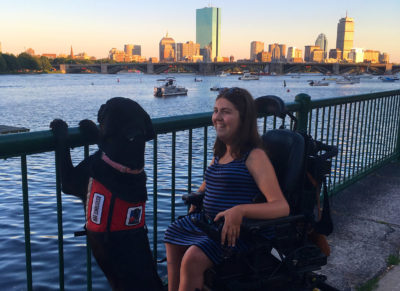
It’s typing a quick Google search, filling out a form for false credentials at a small fee and purchasing a “service dog” vest on Amazon, and a household pet is afforded the rights of public access mandated by the Americans with Disabilities Act.
Soon, however, this manipulation of federal law could be banned by the state government, with a bill calling for the misrepresentation of a pet dog as a service animal to be a civil offense, which was heard before the Joint Committee on the Judiciary Tuesday. Rep. Kimberly Ferguson, a Holden Republican, is the bill’s key sponsor.
By definition, a service dog is one that has been properly trained to cater to the specific needs of a person with disabilities, according to the ADA.
Under the proposed bill, any individual who intentionally misrepresents their dog by bringing the animal into a place of public accommodation where pets are not permitted, and has some form of false identification — leash, vest, credentials — implying the dog is a service animal, may have their pet removed from the area by police or an animal control officer, be assigned community service or face a fine in absence of service.
The practice of individuals dishonestly claiming their animal is a service dog has become so common that Cathy Zemaitis, spokesperson for NEADS/Dogs for Deaf and Disabled Americans, said it is “an epidemic in the United States.”
In reality, Zemaitis said, the extensive training for a service dog at NEADS can take up to two years, and even then, only 50 percent of their dogs are matched with a person to meet their particular needs, following an application, interview and two-week stay with the dog on campus.
“We place dogs with people with permanent, physical disabilities,” Zemaitis said. “Our puppies are purpose-bred, meaning that they’re bred with the idea that this will be a service dog litter. It is a rigorous process.”
Zemaitis said the tipping point for NEADS was when staff began hearing that people were using the organization’s logo, and putting it on their dog, as a means of claiming their animal had been trained by the group.
NEADS began working with Ferguson approximately a year and half ago, starting with only an idea of the bill, Zemaitis said. From there, they formed a committee of internal and external constituents to look at what states already had bills cracking down on fake service dogs, to model their own after.
Over the years, many have taken advantage of the wording of the federal law allowing for those with permanent disabilities to have ease of public access for their pets, Zemaitis said.
“As excited as we are with the possibility of Mass Bill 2277 passing, we are going to go forward and also try to change the wording in the federal law,” Zemaitis said.
Zemaitis said under federal law, any place that allows public access can only ask an individual two questions: Is that a service dog? What tasks does it perform to mitigate your disability?
With the passage of the bill, NEADS is aiming to begin an education piece so store and restaurant owners are more aware of what their rights are in terms of handling situations where it is suspected a dog is being falsely presented as a service animal.
“If that animal is disrupting their normal course of business, legitimate service dog or not, they can ask them to leave,” Zemaitis said. “If those people don’t leave, they can call the police with this bill, they can call the dog officer.”
So far, over 2,000 signatures in support of the bill have been collected, around 60 legislators have come on board to cosponsor the bill and letters of positive testimony have been submitted by the Massachusetts Society for the Prevention of Cruelty to Animals, American Kennel Club, hospital administrators and more, Zemaitis said.
Carolyn Barrett, 23, of Wakefield said she began using a service dog as a teenager for spinal muscular atrophy, and is currently on her second animal from NEADS, a black Labrador Retriever named Shadow.
The use of bogus service dogs, Barrett said, does serious harm to the disability community, delegitimizing their necessary use of these animals.
“If you’ve seen me out with Shadow, she’s hitting handicap door buttons, she’s picking things up, she’s hitting elevator buttons,” Barrett said. “Oftentimes, these fake service dogs just don’t do anything, they’re not well-trained, they’re really interested in other dogs, they’re really interested in other people.”
In light of reading about confusion surrounding the bill, Barrett emphasized that it simply calls for consequences on those who exploit the law.
“If you have a service dog that you trained on your own that does a legitimate thing to mitigate your disability and exhibits proper behavior in public, this bill is not going to affect you,” Barrett said.